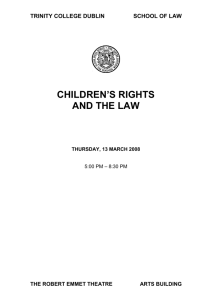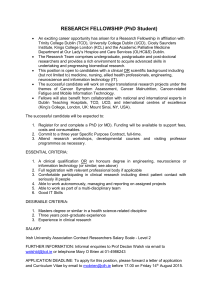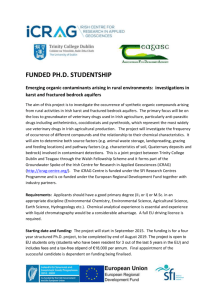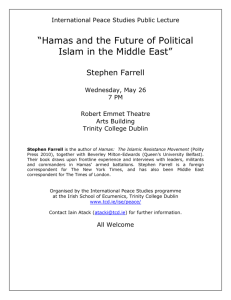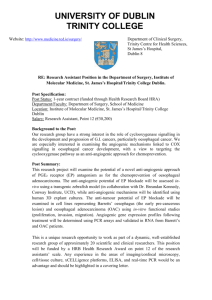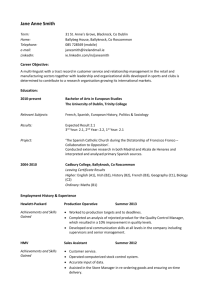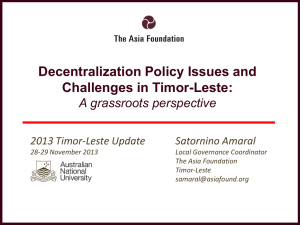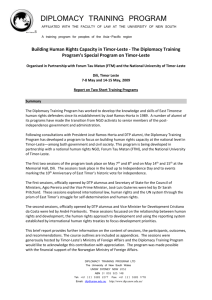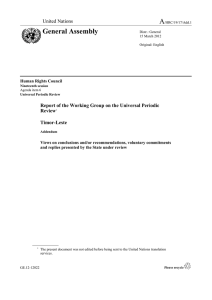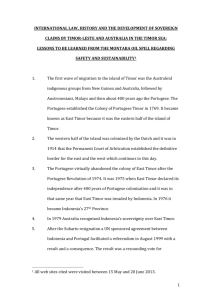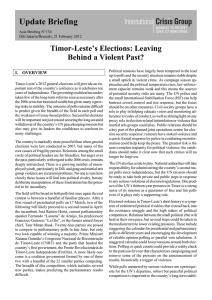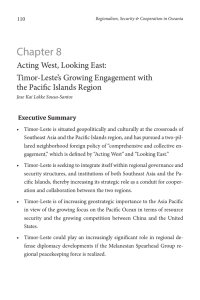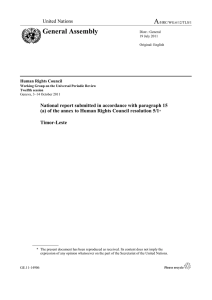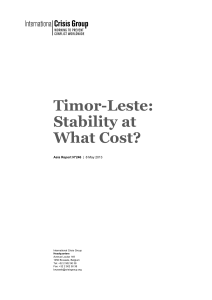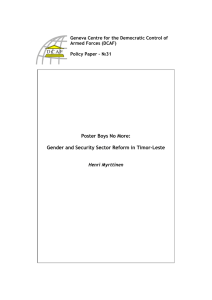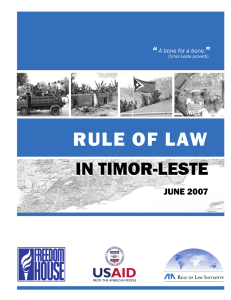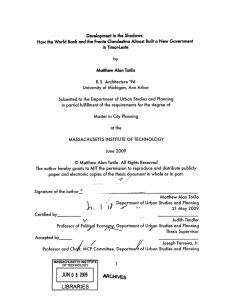The Constitution of Timor Leste
advertisement
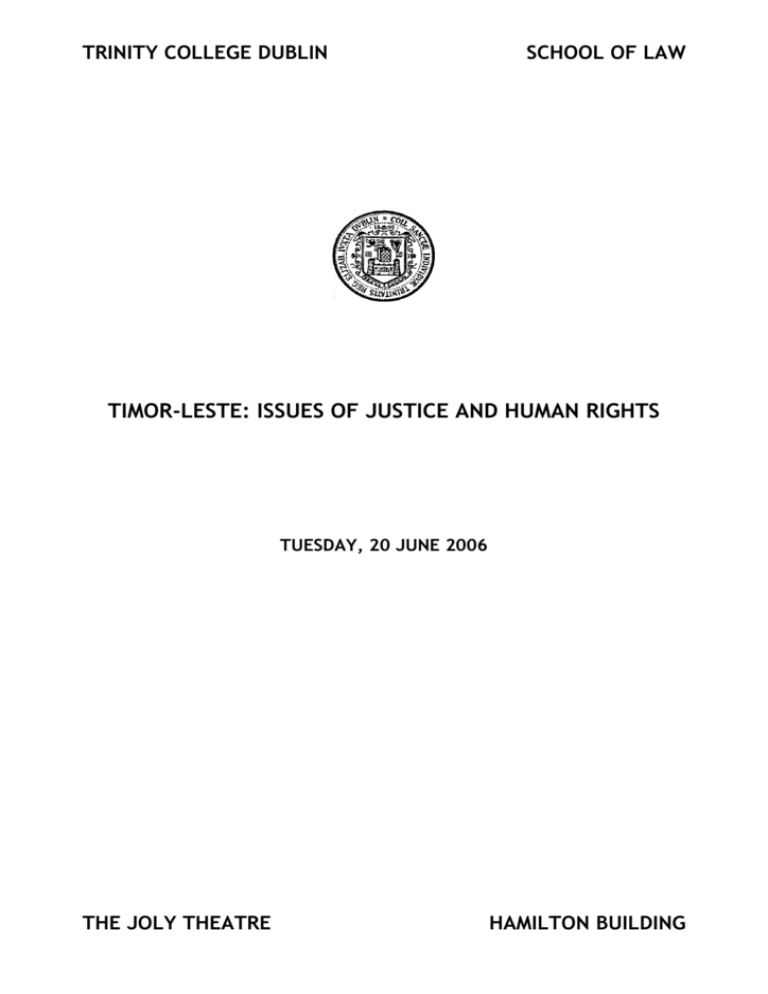
TRINITY COLLEGE DUBLIN SCHOOL OF LAW TIMOR-LESTE: ISSUES OF JUSTICE AND HUMAN RIGHTS TUESDAY, 20 JUNE 2006 THE JOLY THEATRE HAMILTON BUILDING TIMOR-LESTE: ISSUES OF JUSTICE AND HUMAN RIGHTS The Joly Theatre, Hamilton Building, Trinity College Dublin Tuesday, 20th June 2006 The history of Timor-Leste has been one of great difficulty for its people. After centuries of Portuguese colonial rule, its movement for independence was followed by a harsh period of occupation by Indonesia from 1975 to 1999. The process of departure of the Indonesians involved further egregious violations of human rights. The United Nations provided stability during the period when independence was formally declared with a new Constitution. Timor-Leste has since been building up its system of justice and civil administration. Sadly, as recent events have shown, this process is far from secure. The conference addresses issues of justice and human rights in Timor-Leste, looking to the past and the future. It considers such questions as truth and reconciliation models, the problem of impunity, the issue of gender based violence, the justice system the Constitution and the international law dimension. The speakers have special expertise in their subject areas. There will be an opportunity for questions and discussion. PROGRAMME: Morning Session : 9:30 Peter Carey Confronting the Demons of the Past: East Timor’s Challenges of Impunity 10:00 Jeremy Sarkin Achieving Reconciliation in Divided Societies: Comparing the Approaches of Timor-Leste, South African and Rwanda 10:30 David Tombs Searching for Truth and Reconciliation: Innovations in Timor-Leste 11:00 Coffee Break 11:20 Tiago Amaral Sarmento The Judicial System of Timor-Leste: Current Issues 11:50 Siobhan Mullally Responding to Gender Based Violence in Timor-Leste: Seeking Truth, Finding Reconciliation? 12:20 José Eduardo Dias The Timor-Leste Constitution: Comparative Law Aspects 12:50 Questions and Discussion Afternoon Session : 2:00 Gernot Biehler Current International Law Influence in the Government of Timor-Leste 2:30 Clive Symmons Timor Leste (East Timor): Past Problems of Recognition over Denial of Self-Determination 3:00 Questions and Discussion 3:30 End of Conference RESERVATIONS: Fees: €30 per person. Student/Reduced rate - €15. Cheques should be made payable to TCD No. 1 Account. Reservations: Complete the form on the back page and return it to the address below. Catherine Finnegan, School of Law, House 39, Trinity College Dublin 2. Telephone (01) 608 2367; Fax (01) 677 0449; Email: catherine.finnegan@tcd.ie, http://www.tcd.ie/Law/Events.html TIMOR-LESTE: ISSUES OF JUSTICE AND HUMAN RIGHTS SPEAKERS: Gernot Biehler M.A., LL.M. (Cantab.), Ph.D. (Speyer), Priv.-Doz. (Hamburg), is mainly interested in international law, sustainable development and international trade. After a term with the United Nations Legal Adviser he served for more than ten years as a diplomat in New York, Kiev, Bonn, Berlin and Dublin. As head of delegation in the NATO Council of Legal Advisers, EU ministerial councils, The Hague, government counsel before several courts and UN-ECE delegate in Geneva he took a particular interest in the practical and legal impacts of foreign affairs in all spheres of law and has written a treatise on it. He has an extensive range of publications in German, English and Russian in the field of administrative, public and international law and taught at the universities of Heidelberg (where he was awarded a special distinction for academic teaching), Cologne and Kiev. He lectures in international law, sustainable development and also in international business regulation law on the LLM course at the University of Dublin – Trinity College. Peter Carey, M.A., D. Phil., F.R. Hist. S. is Laithwaite Fellow and Tutor in Modern History at Trinity College Oxford. He works on the history, contemporary politics and socio-economic development of Southeast Asia, specialising on Indonesia, East Timor and Burma. He is currently researching an oral history of the Indonesian occupation of East Timor (1975-1999). His publications include ‘The Security Council and the Question of East Timor, 1975-2006’ in The UN Security Council and War (ed. V. Lowe, A. Roberts, J. Walsh and D. Zaum), East Timor at the Crossroads: The Forging of a Nation (London, 1995), ‘Third World Colonialism, the Geracao Foun and the Birth of a New Nation: Indonesia through East Timorese Eyes, 1975-99’, Indonesia. Vol 76 (2003) pp. 23-67 and ‘East Timor Under Indonesian Occupation, 1975-1999’ in Handbook on Terrorism and Insurgency (ed. Andrew Tan, Malvern, 2006). José Eduardo Dias is an Assistant Professor of Administrative Law at the University of Coimbra. His Masters dissertation was on environmental law and he has published widely on administrative law, environmental law and a range of other legal subjects. He will be teaching Constitutional Law in East Timor next September. Siobhan Mullally is a Senior Lecturer in the Faculty of Law, University College Cork, where she teaches Human Rights and International Law. She holds law degrees from the EUI, Florence, LSE and U.C.C. and has held visiting scholar appointments at Harvard Law School, Cornell Law School, University of Sydney and Osgoode Hall, Canada. In 2004, she worked as a human rights and gender adviser to the Office for the Promotion of Equality (Prime Minister's office) in Timor-Leste, where she was coordinated preparations for Timor-Leste's First Report to the UN CEDAW Committee. She also worked as an advisor to UNDP on the newly established Office for the Provedor of Justice and Human Rights. Siobhan has published widely in the fields of gender and law, women's human rights and refugee law. Her book, Gender, Culture and Human Rights: Reclaiming Universalism, was published with Hart, Oxford, May 2006. Jeremy Sarkin is Senior Professor of Law at the University of Western Cape and Attorney of the High Court, South Africa and of New York. He is Scholar-in-Residence at the Washington and Lee University School of Law. A former acting Judge in the Cape High Court, he is author of Carrots and Sticks: The TRC and the South African Amnesty Process, and co-editor (with William Binchy) of Human Rights, the Citizen and the State: South African and Irish Perspectives (2001), published by Round Hall and The Administration of Justice: Current Themes in Comparative Perspective, published by Four Courts Press in 2004. Tiago Amaral Sarmento is Director of the Judicial System Monitoring Programme, Timor-Leste (JSMP) which was set up in early 2001 in Dili. Through court monitoring, the provision of legal analysis and thematic reports on the development of the judicial system, and outreach activities, JSMP aims to contribute to the ongoing evaluation and building of the justice system in East Timor. It is the leading international electronic resource on the East Timorese justice system. Clive Symmons is Research Associate in Law in Trinity College Dublin and Adjunct Professor in Law at the Marine Law and Ocean Policy Centre, NUI Galway. He has written extensively on the Law of Tort, various aspects of International Law, particularly the Law of the Sea, also Anglo-lrish legal relations and Catherine Finnegan, School of Law, House 39, Trinity College Dublin 2. Telephone (01) 608 2367; Fax (01) 677 0449; Email: catherine.finnegan@tcd.ie, http://www.tcd.ie/Law/Events.html TIMOR-LESTE: ISSUES OF JUSTICE AND HUMAN RIGHTS Irish law. He has published on international law aspects of East Timor, including two chapters in Pedro Pinto Leite ed., The East Timor Problem and the Role of Europe. David Tombs is a political theologian working on the Belfast-based Reconciliation Studies programme of the Irish School of Ecumenics, Trinity College Dublin. He has an interest in the international lessons from truth commission initiatives in post-conflict societies and their relevance for the truth-recovery debate in Northern Ireland. His publications in the area of truth and reconciliation include Explorations in Reconciliation: New Directions for Theology (Aldershot: Ashgate, 2006) and Truth and Memory: The Church and Human Rights in El Salvador and Guatemala (edited with Michael A. Hayes; Leominster: Gracewing, 2001). CHAIRPERSONS: William Binchy is Regius Professor of Laws at Trinity College Dublin and is a member of the Human Rights Commission. He lectures on the Legal System of Timor-Leste and on African Human Rights Law and is the co-editor, with Jeremy Sarkin of Human Rights, the Citizen and the State: South African and Irish Perspectives (2001), published by Round Hall and The Administration of Justice: Current Themes in Comparative Perspective published by Four Courts Press in 2004 and co-editor, with Catherine Finnegan, of Human Rights, Constitutionalism and the Judiciary: Tanzanian and Irish Perspectives, published by Clarus Press in June 2006. Aoife Nolan LL.B (Dub.), PhD (EUI), successfully defended her PhD focusing on the judicial treatment and enforcement of children's socio-economic rights at the European University Institute, Florence. She lectures on the Legal System of Timor-Leste and on African Human Rights Law in the Master of Laws Degree Programme at Trinity College Dublin. She is also a Senior Legal Officer with the Economic, Social and Cultural Rights Litigation Programme at the Centre on Housing Rights and Evictions, Geneva Switzerland. Her primary areas of research are children's rights, socio-economic rights, international human rights law and public interest law. She has written and been published on these topics. She has been a Visiting Research Fellow at Columbia University School of Law, New York, and has spent time as a Visiting Student at the University of Cape Town. BOOKING FORM Please complete in BLOCK letters NAME(s) : COMPANY/ORGANISATION: ADDRESS: TEL: FAX: EMAIL: CHEQUE ENCLOSED IN THE SUM OF: Catherine Finnegan, School of Law, House 39, Trinity College Dublin 2. Telephone (01) 608 2367; Fax (01) 677 0449; Email: catherine.finnegan@tcd.ie, http://www.tcd.ie/Law/Events.html
